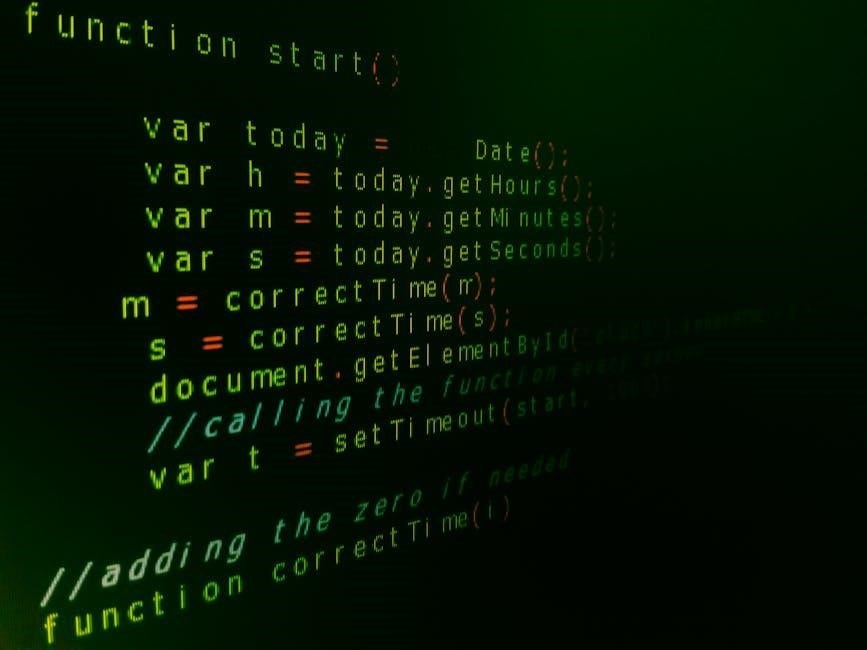Computer programming is the process of designing and writing computer programs to solve problems or perform tasks. It involves creating algorithms and coding them into a programming language. With resources like Beginning Programming For Dummies and Coding For Dummies‚ anyone can start learning to code‚ regardless of their background. These guides simplify complex concepts and make programming accessible to everyone.
What is Computer Programming?
Computer programming is the process of designing‚ writing‚ and testing instructions that a computer can execute. These instructions‚ known as programs or software‚ enable computers to perform specific tasks; Programming involves creating algorithms‚ which are step-by-step procedures for solving problems or achieving desired outcomes. It requires logic‚ problem-solving skills‚ and creativity. Programming is used in web development‚ mobile apps‚ games‚ and more‚ making it a fundamental skill in today’s digital world. Resources like Beginning Programming For Dummies simplify learning‚ showing that anyone can master programming‚ regardless of their background.
Why Programming is Important for Beginners
Programming is a foundational skill that enhances problem-solving abilities and logical thinking. It empowers individuals to create solutions‚ automate tasks‚ and innovate in various fields. For beginners‚ learning to code builds confidence and opens doors to career opportunities in technology‚ web development‚ and data analysis. Resources like Computer Programming for Dummies PDF make learning accessible‚ showing that programming is not just for experts but for anyone eager to embrace digital literacy and creativity in the modern world. It’s a skill that fosters growth and adaptability in an increasingly tech-driven society.

Basic Concepts of Computer Programming
Programming involves understanding algorithms‚ data structures‚ and syntax. Resources like Computer Programming for Dummies PDF introduce these fundamentals‚ making coding accessible for all skill levels.
Variables and Data Types
In programming‚ variables store data‚ and data types define the kind of value a variable can hold. Common types include integers‚ strings‚ and booleans. For example‚ an integer stores numbers‚ while a string holds text. Understanding data types is crucial for performing operations correctly and avoiding errors. Resources like Computer Programming for Dummies PDF explain these concepts clearly‚ helping beginners grasp how to declare and use variables effectively in their code.
Loops and Conditionals
Loops and conditionals are essential in programming for controlling the flow of a program. Loops‚ such as ‘for’ or ‘while’ loops‚ repeat tasks until a condition is met. Conditionals‚ like ‘if’ statements‚ execute code based on specific criteria. Together‚ they enable programs to handle decisions and repetitive tasks efficiently. Resources like Coding For Dummies and Beginning Programming For Dummies provide clear examples‚ helping beginners understand how to use these tools to create dynamic and responsive applications.
Functions and Modules
Functions and modules are fundamental concepts in programming that promote code reusability and organization. Functions encapsulate specific tasks‚ making code modular and easier to maintain. Modules extend this by grouping related functions into reusable libraries. In Beginning Programming For Dummies‚ authors like Wallace Wang explain how to create and use functions to simplify programming logic. Modules are also introduced‚ showing how they enhance productivity by allowing developers to import pre-written code for common tasks‚ streamlining the development process and reducing redundancy.

Choosing the Right Programming Language
Selecting a programming language depends on your goals and interests. Popular choices for beginners include Python‚ Java‚ JavaScript‚ and C‚ as explained in Computer Programming For Dummies.
Popular Languages for Beginners
Python for Beginners
Python is an excellent choice for beginners due to its simplicity and versatility. Its clean syntax and forgiving nature make it ideal for learning programming fundamentals. As highlighted in Beginning Programming with Python For Dummies‚ Python supports various applications‚ from data analysis to web development. It’s widely used in education and industry‚ making it a valuable skill. Resources like Programming with Python provide hands-on examples‚ enabling newcomers to grasp concepts quickly and build confidence in their coding abilities. Python’s extensive libraries also simplify tasks‚ allowing beginners to focus on logic and creativity.
JavaScript and HTML/CSS are foundational technologies for web development. JavaScript adds interactivity to web pages‚ while HTML and CSS handle structure and styling. Together‚ they enable the creation of dynamic and visually appealing websites. Resources like Coding For Dummies and Beginning Programming For Dummies provide guides for mastering these technologies. These tools are essential for building modern web applications‚ making them a priority for anyone interested in web development. Learning JavaScript and HTML/CSS opens doors to creating interactive user experiences and customizing web content effectively.

Resources for Learning Programming
Resources like “Computer Programming for Dummies” PDFs offer comprehensive guides for beginners‚ covering various programming languages and providing step-by-step tutorials and practical examples to master essential concepts.
Best PDF Books for Beginners

Beginners can benefit from PDF books like Beginning Programming For Dummies and Coding For Dummies‚ which provide clear‚ step-by-step guidance. These resources cover essential concepts‚ such as variables‚ loops‚ and functions‚ in an approachable manner. Books like Python for Beginners and C For Dummies are also excellent‚ offering practical examples to help learners grasp programming fundamentals. These PDFs are designed to simplify complex topics‚ making them ideal for those new to computer programming. They are widely available online‚ offering a convenient way to start your coding journey.
Online Communities and Forums
Online communities and forums are invaluable for beginners learning to code. Platforms like Stack Overflow and Reddit (e.g.‚ r/learnprogramming) provide spaces to ask questions and share knowledge. These communities are filled with developers who offer guidance and support. Additionally‚ websites like GitHub allow beginners to explore open-source projects and collaborate with others. These forums foster a culture of learning and problem-solving‚ helping newcomers gain confidence in their programming skills. Engaging with these communities can also connect you to resources like tutorials and PDF guides‚ enhancing your learning experience.

Setting Up Your Development Environment
Setting up your development environment is crucial for efficient coding. Install compilers and IDEs to write and run code effectively. Text editors like Visual Studio Code are popular choices for beginners. Ensure your environment is configured correctly to avoid errors and streamline your workflow. Refer to guides like Computer Programming For Dummies for detailed setup instructions.
Installing Compilers and IDEs
Installing compilers and IDEs is essential for writing and executing code. Compilers convert your code into machine-readable format‚ while IDEs provide a comprehensive environment for development. Popular choices include Code::Blocks for C/C++ and PyCharm for Python. Download the correct version for your operating system from official websites. Guides like Computer Programming For Dummies offer step-by-step installation instructions. Ensure compatibility with your system to avoid errors. Proper installation sets up your workspace for efficient coding and debugging. Refer to the Beginning Programming For Dummies PDF for detailed setup guidance.
Using Text Editors for Coding
Text editors are lightweight tools for writing and editing code. Popular choices include Notepad++‚ Sublime Text‚ and Visual Studio Code. These editors offer features like syntax highlighting‚ which makes code easier to read. They also support plugins to enhance functionality. For beginners‚ Visual Studio Code is recommended due to its user-friendly interface and extensive library of extensions. Guides like Coding For Dummies often suggest using these tools for their simplicity and flexibility. Text editors provide a distraction-free environment‚ allowing programmers to focus on writing clean and efficient code. They are ideal for small projects or quick edits.
Practicing and Building Projects
Practicing coding through simple exercises and building real-world projects helps solidify programming concepts. Resources like Beginning Programming For Dummies and Coding For Dummies provide guidance for starting small and scaling to complex applications‚ making learning hands-on and effective.
Simple Exercises for Beginners
Simple exercises are essential for building foundational programming skills. Starting with basic tasks like calculators or quizzes helps beginners grasp syntax and logic. Resources like Beginning Programming For Dummies and Coding For Dummies offer step-by-step exercises that gradually increase in complexity. These exercises focus on problem-solving‚ understanding variables‚ and controlling program flow. By completing these‚ new programmers can confidently move on to more advanced projects‚ ensuring a strong understanding of core concepts before tackling real-world applications.
Building Real-World Applications
Building real-world applications is a critical step in mastering programming. It allows beginners to apply their skills to practical projects‚ such as web applications‚ tools‚ or games. Resources like Beginning Programming For Dummies and Coding For Dummies provide guidance on transitioning from simple exercises to complex tasks. These projects help learners understand how to integrate multiple concepts‚ troubleshoot issues‚ and optimize code for efficiency. By working on real-world applications‚ programmers gain hands-on experience and confidence‚ preparing them for professional development environments.